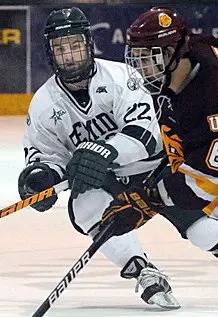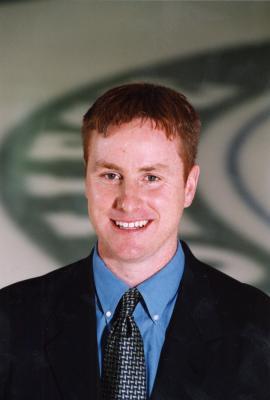The University of Wisconsin-Stout’s 3-2 victory over St. Olaf at the Xcel Center on Saturday (which we’ll have more on later) wrapped up the regular season action between the NCHA and the MIAC.
With a 24-6-3 record over the MIAC this season the NCHA once again obliterated its western foes and has gone 66-21-5 against them over the past two years.
Before anyone in the NCHA starts puffing their chest out too far, however, let us not forget that the MIAC is 3-1 against the NCHA in the past two NCAA tournaments.
While we don’t yet know if the MIAC will rise to the occasion again this year, we do know that a new week means a new edition of the USCHO.com Division III men’s poll.
St. Norbert remains the top ranked team in the West and slides up a spot to No. 3 following a sweep over UW-Superior. St. Scholastica again follows as the Saints landed at No. 5 on the tails of a sweep over UW-Eau Claire.
UW-River Falls drops three spots to No. 14 after a home split against UW-Stevens Point, while UW-Superior clings to four votes despite having gone 1-7-1 in its last nine.
Stout’s win over the Oles was enough for the Blue Devils to hang onto their two votes from last week while Adrian’s convincing sweep over Lawrence moves the Bulldogs up a spot to No. 11. Adrian remains the only MCHA team to have received votes.
Sabre Rattling
It was the opening weekend of the MCHA season and Marian was coming off an impressive 3-2 non-conference win over the NCHA’s UW-Eau Claire.
Up next was a pair of home dates with league favorite Adrian. Between Marian’s consistent improvement over the past few seasons and the win over the Blugolds a week earlier, many thought the series might be a prime spot for Adrian’s cart to get upset.
It was not to be, however, as the Bulldogs skated into Fond du Lac and dropped the Sabres 4-1 and 9-1. The 0-2 start mired Marian in the bottom half of the MCHA standings for awhile, but their position was a bit deceptive as it meant little unless someone else in the MCHA was able to step up and drop the Bulldogs.
It hasn’t happened thus far and in the meantime Marian has rolled off nine consecutive MCHA victories and now sits at second in the league and alone atop the North Division. If the playoffs started today the Sabres would receive a bye to the Harris Cup Semifinals thanks to winning their division.
Their climb to the top culminated with last Tuesday’s win over Lawrence that was discussed here last week.
“At the time it was very big and I think even at the end of the season we’ll look back on it as a big win,†said Sabres’ head coach Jasen Wise, who is in his sixth season at Marian. “We want that first round bye so to get that win and move past them in the standings was big.â€
As a refresher, the Sabres had to kill off nearly two minutes of 6-on-3 to close out the game and hold on to for the 4-3 win.
“It was a big morale boost and a big team building experience in the sense that we rallied together down 6-on-3 and got the win,†Wise said.
Marian’s slow start, at least in the standings, virtually dropped the Sabres from all discussions on the fan side of things, though Wise insists that most certainly wasn’t the case around the MCHA itself.
“Maybe for people on the outside that was the case, but I think for people on the inside in terms of [the other teams in our conference] that, because they see us on a regular basis, they know what we bring. So from their perspective I don’t think we were flying under the radar on anyone. Maybe that was the case for the casual fan, but not for the rest of the league.â€
Marian is one of the MCHA teams that have observers just waiting for them to break through, but for the third season in a row the Sabres’ non-conference season was one of heartbreak.
After defeating Eau Claire early, the Sabres had to wait until January to play its final non-conference games. The two week stretch ended with losses to Superior, Stevens Point and two to Gustavus Adolphus. Aside from the Stevens Point game, the Sabres were in every one right down to the bitter end.
“We know we can skate with them and play with them so from that standpoint we built some confidence,†Wise said. “Where we need to improve is how we play in pressure situations, particularly the last ten minutes of the game. I think that’s what is keeping us from winning those close games against ranked teams.
“I think our speed is there, our physical play is there, our decision making is there, but when the game is on the line we need to get better.â€
Marian is no doubt hopeful the lessons learned will help as it hits the MCHA homestretch, and that it can hold onto the North Division lead and score the bye to the semifinals. Up first if that is to be the case is a home-and-home this series with Lake Foresters. The Foresters enter the weekend at 7-4-1 in league play and in third place, three points behind the Sabres.
“They are young, they play very physical and they’ve got some guys who can score, especially on the blue line,†Wise said. “We hope to stay in second. This is a big series this weekend as Lake Forest is right behind us so we need a couple of wins to stay here.â€
Regardless of what happens against Lake Forest, who is in the South Division, the North Division title and subsequent playoff bye will likely not be determined until Marian and Lawrence finish off their season series. Thanks to a bit of a scheduling quirk, all four meetings between the two come in the second half of the season and three are yet to be played.
“It adds a lot of excitement to the second half of the season and it really helps that both teams will likely be playing their best hockey at that time. I think it’s a great situation for both teams and adds a lot for the players.â€
Upping the ante in the Marian-Lawrence series a bit is the initiation of the “Battle for 41†rivalry trophy. As the two schools are a mere 45 miles apart on highway 41, the traveling trophy will be earned by whichever team wins a predetermined three game regular season “series†between the two. As luck would have it, this season’s three games are the three that remain to be played.
A definite nice touch for a budding rivalry in a league still developing its identity, especially considering all three games involved are absolutely crucial to the final standings. Despite clinging to a one point lead on the Vikings at this time, Wise and the Vikings would have it no other way:
“I think the way it worked out is great.â€
The Blue Devils Are In The Details
It’s been an up-and-down season thus far for a team that made it all the way to Lake Placid a year ago and was a near-consensus pick to take the NCHA this season.
The Blue Devils’ NCHA season didn’t kick off as well as they hoped as St. Norbert rolled into Dunn County Arena and skated away with a pair of wins. The most surprising aspect of the weekend might not even have been the game results, however, but rather that the Blue Devils were outshot 83-38 in the 2-0 and 4-1 defeats.
“The first night was a great game,†said Blue Devils’ head coach Terry Watkins. “It was a 1-0 game and they scored the second goal with seven seconds left so it was a tight game start to finish.â€
Though the loss was a setback in the short term, it was nowhere near as significant as the long-term losses suffered on that opening night. Six Stout players suffered injuries in the contest, and those to senior defenseman Bobby Kuehl and sophomore forward/defenseman Matt Morin were season-ending.
“You take six guys out of your top 20 in this league and that creates a problem,†Watkins said. “We felt pretty good coming into the year, but that leaves a dent. We’ve played three freshmen defenseman and a bunch of freshmen forwards at times, so some kids had to grow up a little bit, and they have.â€
Despite being shorthanded in the health department, the Blue Devils ran off six unbeaten with non-conference wins over St. Mary’s and St. Thomas, a pair of ties at St. Scholastica and a home sweep over Stevens Point.
That set the stage for Stout to make the trip east over Thanksgiving weekend to join Norwich, Middlebury and Plattsburgh in the prestigious Primelink tournament. This year’s edition was hosted by Norwich at Kreitzberg Arena and received nothing but praise from Watkins.
“The experience was awesome,†he said. “We did not imagine we were going to be treated as well as we were. We knew it was going to be a good experience but we were treated wonderfully by absolutely everybody.
“[The arena] is beautiful. The whole setup was just great: A wonderful banquet, a beautiful part of the country, and nice people. Everyone was very pleasant to us and I can’t say enough about the way we were treated.â€
Unfortunately for Stout, the off-ice treatment was not indicative of the rude awakening Norwich had in line for the Blue Devils in their opener, as the home Cadets opened up a 3-0 lead in the opening period before ultimately dropping a 9-1 shellacking on the Blue Devils. Stout was outshot 53-14 in the contest.
“The bottom line is that we didn’t play very well,†Watkins said of the Norwich game. “After that first night I watched the film and was like ‘who is this team?’ We just stood around and got beat by a very good Norwich team.â€
Seeking redemption in the consolation game against Middlebury, the Blue Devils got off to a much better start as they outshot the Panthers 13-7 in the opening frame and tallied three times. Unfortunately for Stout, however, it also conceded three goals in the period.
The Panthers scored once in the second period and added three more in the third while not conceding Stout another en route to a 7-3 win. Between the two games, the Blue Devils were outscored 16-4 and outshot 91-40.
“Overall we just didn’t play very well. Were we good enough to beat either team? I don’t know. I don’t think we are good enough to beat Norwich and I think if we had shown up and played hard we would have had a chance to beat Middlebury,†Watkins said.
The Blue Devils struggled a bit the following week as well, notching only one point in a league series with UW-Eau Claire but responded in their final series prior to winter break with a road sweep over rival River Falls.
After the layoff, they resumed NCHA action with a road series at Superior and walked away from that one with four points as well. The four straight league wins left Stout at 6-3-3 in the NCHA — good for third in the league and a mere two points back of St. Scholastica for second.
“Our league is pretty darn good right now and to go into a weekend and get some points on the road is big. I look at the River Falls and Superior series and we got eight points on the road. That’s huge,†Watkins said.
While their 6-3-3 record in the NCHA has the Blue Devils in position for playoff home ice, it’s somewhat peculiar that they only hold a 3-4 mark in non-conference play, including a pair of losses to Augsburg and Gustavus Adolphus three weeks ago.
“We’ve got some new kids and with six of our better guys out we’ve had to find out what some of these other kids can do,†Watkins said. “We’ve played some lineups one some nights that, looking back, probably weren’t our best lineup.
“We were in a position after losing a few games that we weren’t getting into the [NCAA] tournament because of our record. We’ve got to be playing really well down the stretch here so you want to start trying to develop things that can help us out, so we maybe did some things in the non-conference games we wouldn’t have done in a conference game.â€
Stout was the lucky recipient of a NCHA bye a week ago, though they did square off in a non-conference tilt with St. Olaf last weekend. It was no mere non-conference game, however, as it was played at the Xcel Energy Center, home of the NHL’s Minnesota Wild, as part of Hockey Day Minnesota, a statewide event aimed at celebrating the hockey culture of the state.
The Blue Devils ultimately won the game, 3-2, but the memories of playing in a venue like the Xcel will likely persist far longer than those of the one goal non-conference win.
“It was pretty neat,†Watkins said. “You get in there and see the locker rooms and such and it’s special. You see what the Wild get to walk into and you skate out into a venue that I can’t imagine being full of people.
“It was something to stand on that bench and look up at that huge scoreboard. Heck, the empty seats were pretty impressive and I can’t imagine all those seats with people in them. It was just a fun hockey experience.â€
As it turned out, the Stout players and coaches weren’t the only ones to participate in the experience.
“It was actually our home game,†Watkins said. “We brought nine of our people over there. The music guy, the scorekeeper, goal judges and off-ice officials and they all did a tremendous job. On top of it, there were 1,400 fans there and about 1,200 of those were Stout people. It was a great turnout.â€
It has to be considered a special season from an experience standpoint when a team is not only able to participate in the prestigious Primelink but also skate 60 minutes in an NHL venue. That said, those experiences are now behind the Blue Devils.
Now fully healthy with the exception of Kuehl and Morin, having won four consecutive league games, and with a crack at second place in the NCHA this weekend, all focus is on the future according to Watkins.
“Number one you want to secure home ice for the first round,†he said. “In this league, especially with our rink and our fans, securing home ice is no doubt an advantage. Our immediate goal is to try to lock that down and if we are able to sneak a couple points out of this weekend I’d be very, very pleased.â€
Life On The Road
As mentioned, last Saturday’s game between Stout and St. Olaf at the Xcel Energy Center was a small part of the festivities that comprise Hockey Day Minnesota. Initiated four years ago, Hockey Day Minnesota was established with the intent of celebrating the game that Minnesota, “The State of Hockeyâ€, holds above all others.
I’m a Wisconsin native and still have always considered it a great event that helps celebrate Minnesota’s hockey culture while also offering memorable experiences for coaches, players, parents and fans.
As such, I must admit I was somewhat surprised when at one point on Saturday I heard someone lamenting the entire concept while suggesting it is nothing more than a scam by FSNorth aimed at making money.
Reluctantly dignifying that thought for a moment: so what if it is? I highly doubt it mattered to the high school players who participated in televised outdoor games or to their parents who got to revel in their children’s experiences.
It certainly didn’t matter to Stout head coach Terry Watkins and St. Olaf head coach Sean Goldsworthy who both changed goaltenders at the midpoint of their Saturday affair just so both their netminders could see game action in an NHL Arena.
Moving significantly further down the totem pole, it was the last thing on my mind as, thanks to some accommodating Xcel staff, I was afforded a highly unexpected opportunity to attend and cover a Division III game from press row in an NHL arena. As a guy whose competitive hockey experiences amount to toiling away at the outdoor rink at midnight, it was an experience I will not forget.
And finally, an acquaintance of mine. Lee Kluck is a good friend of mine but he’s a baseball guy. He has done significant work on high school, college and minor league baseball and has a habit of directing friendly ridicule my direction because he can’t quite understand my obsession with the game of hockey. Well, actually I think he does but he just doesn’t want to grant me the joy of seeing him admit it.
Regardless, in a weird stroke of luck, he joined me at the X on Saturday and, unprompted, sent me an email after the fact. I feel compelled to include it here as if Lee was able to become enraptured with a Hockey Day Minnesota event, anyone can be, and that’s something the guy whining about the entire concept should pay attention to.
His e-mail read:
“I will be the first to admit that I am not the most diehard of hockey fans. Therefore, when the chance came up to cover the Stout-St Olaf game at the Xcel Energy Center in St. Paul as part of Hockey Day Minnesota, I really didn’t know what I could add to the coverage from a hockey standpoint.
Once I got to the arena however, the shear enormity of my task, instead of overwhelming me, made me rise to the challenge. This is because I realized that, what Hockey Day is all about, is providing an experience that many of the players, no matter what their age, will consider the highlight of their hockey careers. The same goes for members of the media.
I, for example, had done radio for a handful of Division III games at UW-Stevens Point. No Frozen Fours, Stanley Cup game seven’s or Olympic gold medal games for me. However, the minute I walked in the front gate it was like I was every other club reporter.
For instance, after explaining to the security guard at the press gate who I was, there was a brief problem vetting my credentials. However, instead of running me off, the young man at the gate (who coincidentally is a UW-River Falls grad) made four phone calls on my behalf. The problem was quickly resolved and I was kindly escorted to the press box level. Once there, again all possible requests that I may have had were filled.
I felt like I was just as important as Mike Sweeney of the Minneapolis Star Tribune, whose seat I happened to be sitting in. I could walk where the paid scribes walked, I could see what they see, and I could dream about what it’s like to be on the NHL beat forty nights a year.
But then again, that makes sense. Hockey Day Minnesota is supposed to be about dreaming big time hockey dreams. No matter if that dream involves standing on the ice or in line at the pressroom buffet. Oh, and in case you were wondering . . . Stout defeated St. Olaf, 3-2.â€
Tasty Travels
Alas, the full return of the conference seasons means a return to some travel for yours truly. It also means I have to eat somewhere along the way.
This week’s establishment is the first fan recommendation of the season and comes from a loyal River Falls fan, who recommended the “River Falls Family Restaurantâ€, along with the suggestion to not be fooled by its somewhat innocent sounding name.
Located at 1109 N. Main St. in — where else? — River Falls, I’m just going to get it out of the way early: this place absolutely puts the Perkins that is right down the road to shame.
Myself and two acquaintances all ordered breakfast, and I considered not doing so in order to mix things up, but since I was in town for a River Falls game I just couldn’t pass on the “Falcon’s Specialâ€. It only seemed fitting.
With eggs, pancakes, bacon, sausage [i]and[/i] ham, it looked promising, and the kitchen delivered on that promise. A definite quality breakfast, and my companions were equally impressed with theirs which both included homemade sausage gravy that while not only being legitimately homemade, was legitimately good. One of the others indulged in dessert and insisted that the pecan pie was fantastic.
A prototypical “greasy spoon†with a giant menu, the place has something for everyone, be it breakfast, salads, wraps, seafood or meat and potatoes. The service was of the highest quality and it was cleaner and nicer than most family restaurants.
It was also affordable, as my gut-stuffing breakfast and a beverage drained my wallet all of $9 plus tip.
Overall, I’d recommend this place to anyone. As these ratings are always “class-relativeâ€, meaning I’m not going to compare a local joint to a high end Los Angeles steakhouse, the River Falls Family Restaurant delivers exactly what you expect and it does it well.
Hence, it receives: three pucks.





